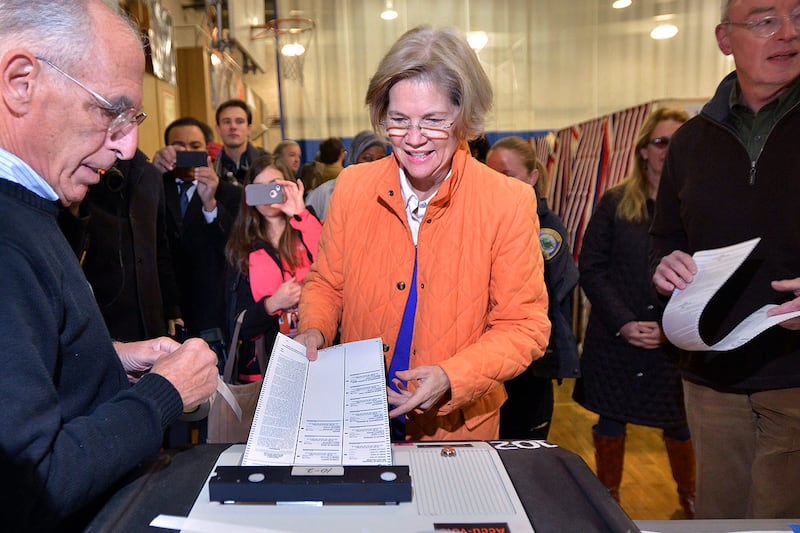In this campaign cycle, the Republicans engaged in a series of self-defeating exercises that weakened their standing in the Senate. Veteran Indiana Senator Richard Lugar was successfully primaried by Tea Party favorite Richard Mourdock, who imploded. There was Todd “legitimate rape” Akin in Missouri. But nothing was so self-defeating as Republicans’ refusal to confirm Elizabeth Warren in 2011 as head of the Consumer Financial Protection Bureau (CFPB), the agency she conceived and stood up for—in the face of opposition from within the administration, Congress, and the vast financial industry lobbying complex. Senate resistance to her appointment sent Warren back to Cambridge, Mass., where she launched a seemingly quixotic challenge to Sen. Scott Brown.
Many analysts thought Brown, the telegenic, moderate Republican who held Ted Kennedy’s seat, would have an easy time against the excitable grandmother with the Oklahoma accent. Instead, Warren crushed Brown by a 54–46 margin.
Her candidacy is interesting on many levels. “This is historic because, for the first time in the history of the United States, we have a woman from Massachusetts in the Senate,” notes Victoria Budson, executive director of the Women and Public Policy Program at Harvard’s John F. Kennedy School of Government.
An accomplished law professor, Warren nonetheless showed an ability to present a coherent, Ivy League form of populism. “I was a little taken aback by the stuff in The New York Times where Mayor Bloomberg said she was bringing socialism back,” says Robert Johnson, a former Wall Street trader who is executive director at the Institute for New Economic Thinking, and who worked with Warren on the development of the CFPB.
Warren won the Senate race, Johnson argues, not because of any discussion of derivatives and proprietary trading, but because of bread-and-butter issues. “She looked America in eye and defied elites, institutions, and individuals to disagree with a middle-class agenda,” he said. It also didn’t hurt that Warren was a Democrat running in deep-blue Massachusetts in a presidential year. Compared with the 2010 race that Brown won, there were about 900,000 more votes cast in 2012.
At no time in recent history has there been a senator who knows so much about Wall Street—and is so little beholden to it. Democrats from the Northeast, even liberals, are typically creatures of the financial services industry—i.e. New York Sen. Chuck Schumer, and Chris Dodd and Joe Lieberman of Connecticut. After all, the big financial firms are their constituents and provide gushers of campaign cash. By contrast, Warren ran explicitly against the financial services industry—and she still won the money race. According to Opensecrets.org, Warren raised a stunning $39.2 million, compared with $26.2 million for Brown. Some 54 percent of Warren’s funds came from small donations, many of them from out of state, while only 2 percent came from PACs.
In Washington, many observers expect Warren to be deeply engaged in financial reform issues. “I think it will cause a huge uproar if she is not put on the Senate Banking Committee,” Johnson says.
Aside from conceiving the CFPB, Warren served on the Congressional TARP oversight panel. In the coming year, Congress will have to deal with the implementation of the Dodd-Frank financial reform bill. Mike Konczal, a fellow at the Roosevelt Institute, a public policy organization in New York, believes Warren could play a dual role. There will be a certain amount of rear-guard action fighting off Republican attempts to water down the CFBP and undermine its independence. (So far, CFPB, which derives its funding from the Federal Reserve, has wrestled large financial settlements from credit card companies like American Express, Discover, and Capital One over deceptive practices.)
But Konczal expects Warren to be a proactive force. One of the big issues yet to be worked out is the so-called orderly liquidation authority—i.e., how to wind down big banks that fail. “She is one of the most-cited bankruptcy experts, and liquidation authority is designed to look like bankruptcy,” Konczal notes
Progressives expect that having someone who built her political career on bringing transparency to Wall Street and making complex financial lingo accessible will help their cause. “It will make a huge practical difference,” notes Lisa Donner, executive director at American Financial Reform, Washington, D.C., the big public interest group. Warren’s victory “feels like a vindication of an argument that we have made: the way to fight back on Wall Street reform is not to compromise and muddy the water, it is to stand up and clarify the situation.

With her Reconquista of Ted Kennedy’s Senate seat, Warren has become a partisan hero overnight. But Neil Barofsky, the former inspector general of TARP, expects Warren to cause bipartisan trouble in Washington. “She will bring a lot of headaches to the Democratic leadership—or at least that’s what I hope she does,” says Barofsky, who worked with Warren on TARP oversight.
Several Democrats, including Treasury Secretary Tim Geithner and Sen. Chris Dodd, didn’t support her efforts to run CFPB. If the past is any guide, protecting consumers from the predations of financial firms will likely put her in direct conflict with her party’s leadership. And Warren isn’t a go-along-to-get-along type. Barofsky recalls with evident glee that Warren “just filleted Geithner” at a June 2010 public TARP oversight hearing. “There was no good reason for her to do so as someone who was campaigning for an administration position,” notes Barofsky, now a senior fellow at the New York University Law School and author of the memoir Bailout. “That makes her potentially very powerful and potentially very dangerous.”






